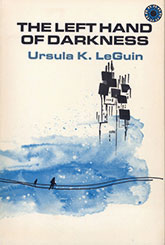The Left Hand of Darkness
Critique • Quotes
 First edition
First editionThe Left Hand of Darkness
First publication
1969
Literary form
Novel
Genres
Science fiction
Writing language
English
Author's country
United States
Length
Approx. 92,000 words
Sexuality is not the only taboo
The Left Hand of Darkness is about a lot of things. But, unlike many science fiction writers, Ursula K. Le Guin doesn't lay it all out for you in comic-book-style exposition. Rather, like a serious mainstream author, she tells you some things, hints at more, and leaves still more for you to discover on your own.
This is because she is not "creating a new world" as SF writers are often said to do, specifying each aspect of it, from the social system on down to spiffy technological devices. The background structure of The Left Hand of Darkness—the Hainish federation of planets with its emissaries visiting prospective members—is already in place from previous stories in the series (of which this novel is the jewel) and is not really very important here.
The alien, future setting just provides a way for humans like ourselves to be brought into contact with people who have turned out differently on a different world, to compare and contrast with our own development. Le Guin does not "create" a world as much as she explores the consequences of subtle differences in worlds and what they tell us about ourselves.
One of the prime differences between ourselves and the people on Gethen, the visited world in The Left Hand of Darkness, is how gender is assigned. The Gethenians are each male and female for only a few days of each hormonal cycle. Between these bouts of being "in kemmer"—or in heat, as we might think of it—they are neither one sex nor the other.
Even more interestingly, the sex they turn into while in kemmer depends on the sex of their partners at the time. One turns female, for example, when the partner turns male. And therefore anyone can bear children.
Amazingly, Le Guin wrote Left Hand decades before intersexuality and transexuality became commonly understood and an acceptable subject for writers to explore. No doubt the science fiction setting of the novel helped her get away with exploring such an advanced—and for its time, scandalous—topic.
In the novel, it's clear Gethen sexuality, of course, colours the race's entire outlook, social structure, technological development, philosophical views—all without them being aware that matters could have turned out any differently. From which we are led to consider how our male-female bipolarity has affected our own history and culture, largely without us being particularly aware of it.
Intimate allies
Now, I don't mean to give the impression The Left Hand of Darkness is entirely a meditation on such matters. It would not have become so popular if it were.
All this heavy sexual-identity stuff is presented or hinted at in the course of an exciting plot following an emissary from Terra who attempts to convince the main nations on Gethen that he is genuinely from another planet and that joining the league of worlds would be beneficial. At various points he has to fight hostile leaders, seek allies and flee for his life.
He ends up in a surprising alliance with one particular character. Their final heroic journey together across the frozen wastes of the planet—an Earthling and a Gethenian, a male and an androgynous being, sharing an intimate closeness in struggle against the elements and their own natures for over two months—is the magnificent showpiece of this novel. The reader forgets the sci-fi story and lives with the two through all their hopes and despairs just as one would in a great story of against-all-odds endeavour on our own planet.
Great writing—by turns thrilling, unsettling, provoking and uplifting.
— Eric
Critique • Quotes

